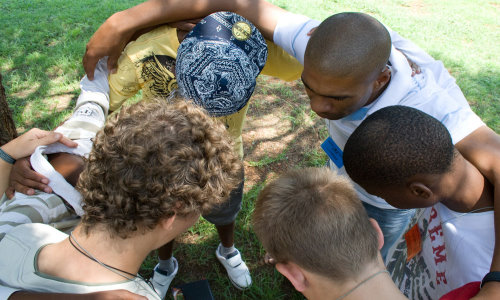
Ephesians 2:10
For we are his workmanship, created in Christ Jesus unto good works,
which God hath before ordained that we should walk in them.
This teaching section takes a look at what God's Word tells us about our walk and what manner of life we should show forth. Let's start by turning to the Scriptures:
1. Created in Christ Jesus unto good works, which God hath before ordained that we should walk in them. (Ephesians 2:10) Here, in the first mention of the walk, we find it connected with works. The believer is the workmanship of God and has a purpose in this life. Whether the works were before ordained or we were ordained to walk in them makes little difference. We can conclude that the mark of the real believer is that he is walking in good works according to the will of God. He fulfills the desire of God.
2. Walk worthy of the vocation wherewith ye are called. (Ephesians 4:1) In Greek, this word worthy means in balance, as the beam on the scales. Our works are to balance the doctrine of the first Three Chapters. This is the balance we should keep in our walk.
3. Walk not as other Gentiles walk. (Ephesians 4:17) This is as much as to say that we are not to be conformed to the world about us. Such a walk is in emptiness of mind, with the understanding darkened, and in such a blindness of heart as to be alienated from the life of God. Such a walk leads only to death, for the wages of sin is death and always has been. Those who have learned Christ do not walk as do other Gentiles. One's true character is revealed by his walk.
4. Walk in love. (Ephesians 5:2) This item and the two following give some detail of the walk of the member of The Body of Christ. This is the testing ground and the basis for judging for rewards and the crown. Walk in love has to do primarily with the relationship of husband and wife (Ephesians 5:22 and Eph. 5:25-33). Every item in these verses is Truth for us today. The wife who is not subject to her husband cannot have joy and peace in this life. She was made to be a helpmeet. Any other position she may take is contrary to nature. Likewise, the husband is to love and cherish his wife, for they are one flesh. The man who obeys this admonition shows forth as an example the love of Christ for His church, which is His Own Body and of His flesh, a Church or Body of which He is The Head.
5. Walk as children of light. (Ephesians 5:8) We are to walk as if in the full Shekinah Glory of the Tabernacle in the Heavens above. For our citizenship is in the Holy of holies in The Heavenly Places, we are blessed there, and we are seated there in Christ. Our walk should be in keeping with such a high calling. This walk can also be applied to the relation of children and parents (Ephesians 6:1-4). The walk has to do with such everyday things as home relationships, not to exploits on the battlefield or the like. The home is the gateway to Heaven.
6. Walk circumspectly. (Ephesians 5:15) Walk carefully. This applies especially to our contacts without the home and may be covered by the relationship of masters and servants (Ephesians 6:5-9). Few workers can be found these days who will do their service as unto the Lord. But this is a testing, and the future service will be gauged by our service now. Those who endure will reign with Him. Our diligence in our job advertises our zeal for the Lord. Ultimately all our service is for Christ and should be done heartily, not as to men, and we know that of Him we receive the reward of the inheritance.
In a past Dispensation, we are reminded that All them that believe...have sinned and come short of the glory of God (Romans 3:22-23). And if that is true, then where does the unbeliever stand? It is common for Rom. 3:23 to be taken out of its context and made to refer to the unbeliever by the self-styled evangelist. But is this distortion of Scripture justified?
In the doctrinal section of Ephesians (Chapters 1-3), we find much about the perfection of the believer. But does he have sinless perfection? If he did, then we would have no need for the last 3 Chapters, which are about practice. We have many do's and don'ts for the members of The Church, which is The Body of Christ. Are these laws? No, they are exhortations for believers. When there was law, there was a covenant. But no covenant today. Yet, we are to understand that there is a reward, prize, crown, or something extra for the ones who suffer or endure in the faith.
Law gave the knowledge of sin, what it was, and to avoid it, lest... But grace tells us about how sin has been abolished as far as a penalty is concerned, for Christ died for our sins. That is grace. So it is up to us to accept that as a fact and walk accordingly.
In Paul's day, there were some who would advocate sinning so that grace would abound. That is a sample of man's reasoning. Just where did he expect to get with that?
And since the Lamb of God has taken away the sin of the world, not imputing men's trespasses against them, there are those who live in darkness who would say that we can now sin without any fear of punishment. And that is true of the unbeliever, for if he never believes, he will never have life everlasting. And there are times when we are inclined to think that many of the living know not anything. Why? Because they are dead already in trespasses and sins. Not all who walk about are considered to be alive - spiritually.
Members of The Church are to walk in love: To love one another as Christ loved us. God is love, and Christ is God. How can one be in Christ and not love his neighbor? Impossible!
Members of The Church are to walk as children of light, as walking in the Shekinah Glory of the Heavenly Places. Why should any prefer darkness? Are their deeds evil?
Members of The Church are to walk circumspectly or narrowly. One who walks in a straight line can save mileage and time and not get lost, as do those who wander all over the landscape and forget where they are going.
The grand and glorious calling of the members of the body is beyond description. Yet, we are to walk worthy of that calling...to walk worthy of Christ. Search the Scriptures. These might be so.
For ye are saved by grace. This is Truth for all times. All men who have ever been saved have been saved by Grace and by Grace alone. It has never been by works. Nor has it ever been by grace plus works at any time. No man has ever deserved salvation. The natural man can do no work that could be pleasing to God. The flesh, the natural man is not subject to the law of God, neither can be.
Salvation has never been forced on any man of any age or dispensation. Peter recognized the universal Truth of this when he said, Whosoever believeth in Him (Acts 10:43), and that also agrees with John 3:16, which uses the same wording. So Salvation comes by faith or belief. That faith may be only like a mustard seed in size at the beginning, but God can make it grow. Man can choose life or death. He that hath the Son hath life, and he that hath not the Son of God hath not life. This is the principle given. Faith is not a work but simply the acceptance of a work that has been done and finished on Calvary.
And this salvation is not of works, or out of works, lest any man should boast. Why? So that no man can cheat our Lord and Savior, Jesus Christ, of the Glory of His finished work. He is to have the preeminence. He is to have The Glory.
For we are created in Christ Jesus. When we believe, then there is a new creation. A new man or new nature is put in us. And all for a purpose; that it might be unto good works. Here is where the works come in. It is after the creation of the new man. And this is logical, for we have seen that the old nature cannot do good works. But here is something that can. It would be very unusual for a man to work before he was hired.
There is a further purpose in this new creation. It is to walk. The new creature has a walk as well as the old one. The old man once walked in trespasses and sins according to the course of this world, according to the prince of the power of the air, fulfilling the desires of the flesh and of the mind. In other words, the flesh is subject to the powers of the world, the flesh, and the devil.
We are to walk in these good works for which we were created. An extended discourse about the walk is to be found in chapters 5 and 6. There is the 3-fold walk; walk in love, walk as children of light, and walk circumspectly. The walk in love applies especially to husbands and wives. The walk as children of light applies to parents and children. And walk circumspectly applies to masters and servants. Here is the practical Christian life.
It would be too bad to have a new creature and find that it could not walk but was doomed to be a cripple forever. But there are many spiritual cripples. Some are paralytics. Some are blind. Some have palsy. They never learn the walk. God's purpose is not fulfilled. And both God and this miserable creature are finally disappointed.
If you are saved by grace through faith and become a new creature, then walk worthy of the calling.
I...beseech you that ye walk worthy of the vocation wherewith ye are called, with all lowliness and meekness, with longsuffering, forbearing one another in love; endeavoring to keep the unity of the Spirit in the bond of peace. Ephesians 4:1-3.
We might say that these attributes of the saint are fruits of the spirit, the new nature. At least, that is what they should be.
It is true that these things can be put on, and one can wear a frozen smile on the face and take a pretended interest in others, but you can't fool them all the time. To be effective and pleasing to God, these must be the fruit of the new nature, not something put on by the old nature.
There is a lot of play-acting in the world today. It is the polite thing to do this, and it is the polite thing to do that, and in society, you would think folks were on a great stage acting out some part that is not theirs but something they imagine they ought to be in the eyes of others. This hypocrisy can have a hardening effect till one is past real feelings and emotions and so frozen that love can not grow.
Lowliness is the forgetting of self and all one can gain above others. It might be well that all of us would practice using i instead of I. We should be lowly enough that we can listen to the other fellow and what he is interested in and what his troubles are. A lot of folks cannot carry on a conversation, for they do not listen to the other person; they are too busy thinking of what they are going to say.
Meekness is along the same line. It is the art of being gentle with others and remaining even-tempered in all things. Small people are greatly disturbed by small things.
Longsuffering is not too far from these two attributes. There are times when we have to endure others. Keeping it up is long-suffering. We can love others without loving their ways and deeds. We have to look past these things that are unpleasant and may annoy us at times.
And here is another one that is along the same line. Forbearing one another in love. In Colossians 3:14, we are told that above all things, we are to put on love. Forbearing is rather hard without love. It is said that in every happy home, there must be two bears; bear and forbear. It is pretty hard to love others till we have learned to love God. That is why the first five commandments were concerning God, and then the other five were about the neighbor. But these cannot be separated. The man who does not love his neighbor does not love God. Neither can one love God until he knows God.
And with these all as a background, one should earnestly strive to keep the unity of The Spirit. God does not say that we should try to make a unity. We are to keep the unity that has already been made without hands and in the heavens. And this being the case, there is no room for strife about the matter but the bond of peace.
I therefore, the prisoner of the Lord, beseech you that ye walk worthy of the vocation wherewith ye are called. Ephesians 4:1
Now before we do any walking, we are going to have to find what this vocation or calling is. It is always best to read the directions first before setting out. We might even go in the wrong direction. Today we are not free to do what we may think is right in our own eyes as it was in the time of the Judges—such results in anarchy.
Let us refer back to the word calling in Eph. 1:18. There, the apostle prays that they may know the hope of His calling. This calling has to do with sonship, as we find in Eph. 1:4-5. Now we are better able to think about what might be involved.
Back in the first three Gospels, we find that Sonship was mainly in connection with The Kingdom promised in Genesis 49 and again to David. But when we get into Ephesians 1:10, we find that there is a much broader aspect of this Sonship. It tells us that in the fullness of times, the Son will be Head over all things both in heaven and in earth.
Now The Hope of His calling in Eph. 1:18 goes much farther than an earthly kingdom in which are the children of promise. It has to do with things in heaven. This is something that a lot of folks have overlooked. They have not realized that there is a program for the heavens as well as for the earth. They do not know that redemption takes in the whole creation. So it is well to study the plan and purpose of God in relation to the ages.
But still, we do not see our relation to His Hope and Calling. It is found in Ephesians 3:6. We are heirs; if so be, we belong to The One Body, which is The Church with its citizenship in The Heavenlies. And we are also partakers of the promise made in Christ before the ages began that there would be eternal life. Those who belong to this group or Church, who have been adopted into sonship, are made meet to partake of His inheritance in the Holiest of all. Colossians 1:12
There it is. Placed as sons that we might partake of the inheritance of The Son. Called sons, even as He was called The Son of God. This is The Calling. And we are besought to walk worthy of such a Calling. What a responsibility!
How can we do it? First, we are to endeavor or strive to keep the unity of the Spirit. We are not to make any unity but to keep one already made. It is made without hands in the Heavenlies.
In subsequent Chapters, the word walk is used three times;
1. Walk in love. As or because Christ has also loved us. The Lord told His disciples to love one another and that this was the sign by which the world would know that they were His disciples. In this connection, read 1 Corinthians 13.
2. Walk as children of light. The children of darkness stumble and cause others to stumble.
3. Walk circumspectly. It has to do with wisdom. The suggested opposite is walking as fools.
"Ye are called in one hope of your calling." During our Lord's short tabernacling in the flesh and the Acts of The Apostles, there were many who kept or observed the Passover feast. Our Lord and His disciples kept it. Paul kept it at that time. But when doing so, not one of them, except the Lord, had any hope of going to the Heavenly Place someday. That was not the hope of their calling. But it was a part of their walk, their behavior.
During that same time, many were baptized with water, the Lord included. It was necessary for that particular calling. But the Lord Himself was the only one who expected someday to sit at the right hand of the Father.
The Lord's supper is mentioned but once in all the Bible. The saints at Corinth observed this common repast at the place of meeting. No record that any other did. But Paul abolished this as it was not conducive to harmony. None of those at Corinth who practiced this carry-in eating expected to be manifested in Glory.
During our Lord's stay on earth, power was given to His disciples. At Pentecost and throughout Acts, power was given, which was manifested in signs and wonders, including speaking in languages. But none of these had the hope of living some time in the Holiest of all, Heaven itself.
Some vainly try today to walk after the laws and ordinances of a past Dispensation and, at the same time, expect to go to heaven someday. Now behaving as a member of one family of God and expecting the inheritance of another family is not consistent. And we have some questions if that inheritance can ever be obtained under such circumstances.
If the church began at Pentecost, then we would be excusable if we expected all the blessings, sign gifts, and the like that were given at that time. That would be reasonable.
But Colossians 2:6 reminds members of The Body of Christ, 'As ye have therefore received Christ Jesus the Lord, so walk ye In Him." How have you received Him? As King, the Messiah of Israel, or as the Head of The Church, which is His Body? How do you acknowledge Him? This will determine the walk.
But for about 1942 years, He has not been offered to the world as the King of kings, nor to Israel as their Messiah. The Kingdom program ceased abruptly at Acts 28:28 and will not be resumed till The Church program is done.
Please do not take my word for it; search and see.
When folks will stand and sing, 'When we all get to heaven,' and then practice the things of The Kingdom here on earth, we begin to wonder a bit. Just what will be their end? Please don't ask me, I don't know. I don't have any idea.
The walk for today is set forth in Ephesians and Colossians. Note, especially Colossians 2:16. All this walk has Heavenly Places in view for the future.
These days, all we need to know about these subjects can be found in Paul's seven last letters; Ephesians, Philippians, Colossians, First Timothy, Second Timothy, Titus, and Philemon.
Careless people are concerned only with the doctrine but not the practice. They boast of all the wonderful things in connection with The Heavenly Places, the Super Heavens, not realizing that they might forfeit their inheritance/prize. And that is why we write as we do.
The members of the church today are blessed with all spiritual blessings in The Heavenly Places in Christ. But too few ever claim their blessings or realize them. Many walk after the flesh, the belly god, and miss the inheritance. They have put their affection on things on the earth rather than on things in heaven where Christ is enthroned.
Some walk as enemies of the cross of Christ. But there are works which God foreordained that we should walk in them. Too many choose not to walk that way. We are to maintain good works, but all too many, like Job, are maintaining their own integrity, their own goodness, and good works. This can result in great loss.
We are to walk worthy of the calling, but we first must know what that calling is. We are not to walk as other Gentiles walk with the vanity of mind (emptiness).
And then, we have the three aspects of the walk that are most important and cover about the whole ground of Christian activities and relationships. Husbands and wives are to walk in love. Parents and children are to walk in light. And masters and servants are to walk circumspectly. For the impact of all this, read Ephesians 5 and 6 very carefully. This is everyday living, the test.
Not only are we to walk worthy of the calling, but also worthy of The Lord. That makes us sit up and think. Just how much does that demand of us? How can we do it? It is by being strengthened with all might, according to His Glorious power. It is not in ourselves to do it.
One great challenge to us is found in the words, As ye have therefore received Christ Jesus the Lord, so walk ye in Him. This means being rooted and grounded in Him. It means to be established in the faith. No self-efforts and/or pretensions will do. This must be the genuine article. No counterfeits.
And you can see that walking and work are very closely related, if not the same thing at times. The walk has to be in wisdom, and true wisdom comes from above. Lay hold on it.
We have a wonderful salvation today. But we are to work out our own salvation with fear and trembling. It is given to us freely, but it is up to us to make it work. And that takes a lot of work. Let's roll up our sleeves!




























